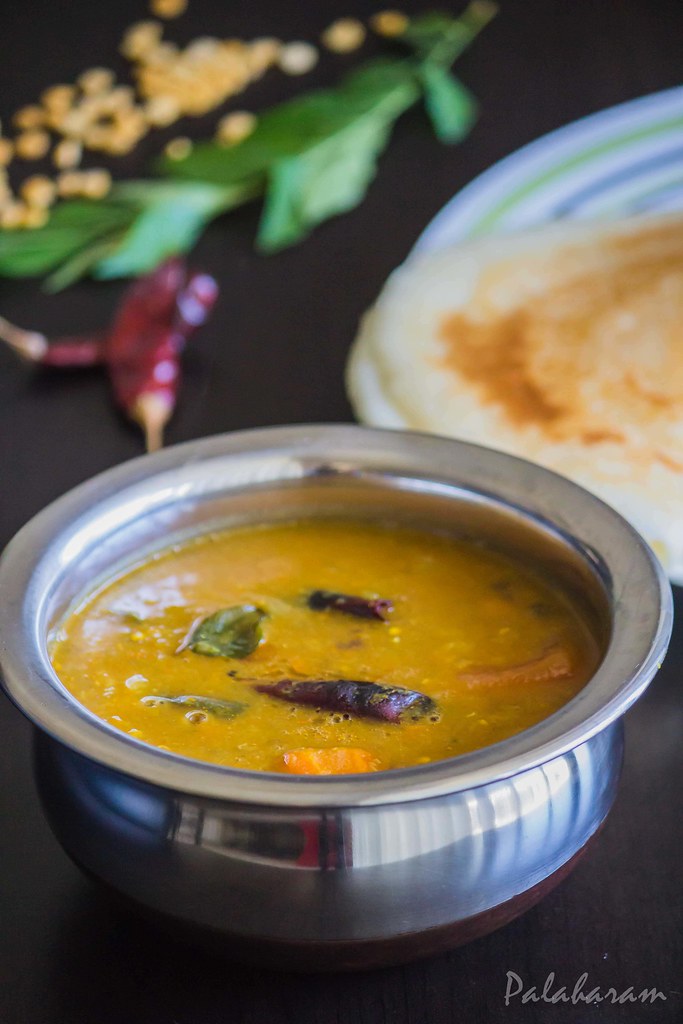Sambar is one unavoidable item on the sadya menu. With onam fast approaching, I thought sharing a sambar recipe would be apt. Whenever I complain that Jacob should get more involved in the kitchen and should take up interest in cooking, he always picks on me saying "who taught you to make sambar ?". Well those initial days of marriages while I was learning to cook to feed our stomach, the sambar preparations were done by Jacob. He is such a sambar lover. I would always prefer moru kachiyathu over sambar for rice. But I guess, as year pass by living with a sambar lover, I too have started to like sambar.
Well this recipe is not the traditional method of sambar preparation. Usually, the sambar powder is fried in the oil along with tempering and added to the sambar . I avoid doing it, to cut down the consumption of oil. Also I find it as an easier way to prepare, without the fear of burning the sambar powder, especially when you have too many things on the menu for sadya and hurrying, things go wrong sometimes. So try my version of sambar if you would like to, for this onam and let me know if you liked it.
 Ingredients
Ingredients
 Ingredients
Ingredients- 1 cup of toor dal
- 1/4 tsp of turmeric powder
- 1 small carrot, peeled and cubed
- 1 cup of sambar cucumber, peeled, deseeded and cubed
- 1 drumstick, cut into 2 inch length and skinned out
- 1 small potato , peeled and cut into cubes
- 1 small tomato, cubed
- 4 okra / lady's finger, cut into small blocks
- 2 1/2 tbsp of sambar powder
- 1/4 tsp of asafoetida
- Small ball of tamarind
- Salt to taste
- 1/2 tsp of mustard seeds
- 2 shallots sliced
- 2-3 dry red chillies
- 1 sprig of curry leaves
- 2-3 tbsp of oil
- Wash the toor dal thoroughly. Let it soak in water for about 30 minutes.
- In a pressure cooker, transfer the soaked toor dal. Add the cut vegetables - carrot, sambar cucumber, drumsticks and potatoes. Add turmeric powder and salt. Add just enough water for the vegetables to immerse.
- Pressure cook on high heat for 2 whistles. Switch off the heat. Let the pressure release.
- Meanwhile, let the tamarind ball stand in a 1/2 cup of hot water for about 5 minutes. using your finger dissolve the tamarind pulp in water. Let it stand.
- Open the pressure cooker. The dal would have cooked thoroughly by now and have gone mushed. Add the tomato and okra to it. Pour in the tamarind pulp having strained out any seeds or strands. Add the sambar powder and asafoetida. Give it all a mix thoroughly. Add more water to attain the consistency that you would want. Put it back on the flame and let it come to a boil. Adjust the salt.
- Remove the sambar on to a serving bowl.
- In a pan, heat the oil for tempering. Add the mustard seeds and wait for it to pop. Add the sliced shallots, curry leaves and red chillies and fry it in the oil. Pour it on top of the sambar.
- Serve it hot with Dosa, Rice, Idli etc.
- You could add variety of vegetables to the sambar other than what I have mentioned, like beans, brinjal, raw banana etc.
- I add tomato and okra to the end because pressure cooking would make those vegetables loose its shape and turn mushy.
- Some people don't prefer the taste of pressure cooked vegetables. In that case, you could just pressure cook the dal alone and later add the vegetables and cook it open. Once the vegetables are cooked, follow the rest of the step as is.
- You could fry the sambar powder and asafoetida in the oil used for tempering before adding it to the sambar. In that case you would require a bit more oil and would need to be careful to avoid burning of sambar powder. I avoid frying it, to reduce the amount the oil that we consume and it is liked by my family.



No comments:
Post a Comment
Thank you for paying us a visit :). If you happen to have tried any of the recipes posted here, please do leave a comment that could serve as a review for other fellow visitors of Palaharam.
Also, do feel free to send in your suggestions that could help us improve and serve you better using the 'Contact Us' form.